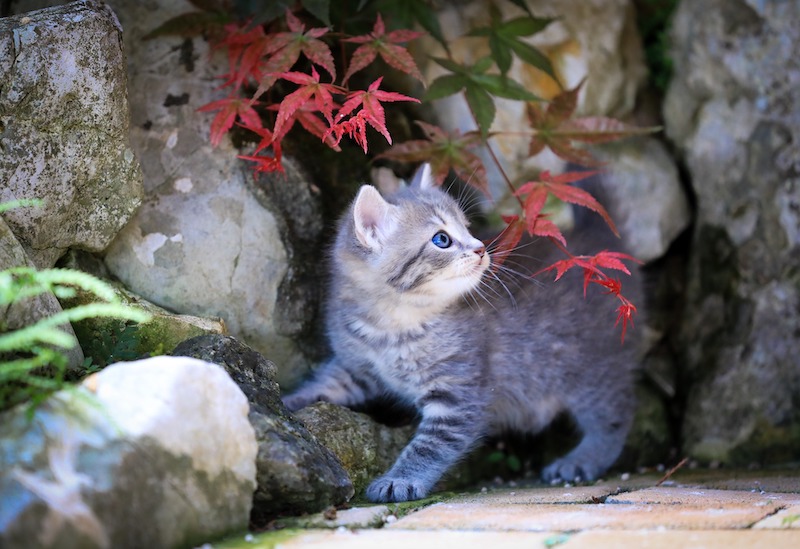Japanese maples, Acer palmatum, are spectacular shade and understory trees for any landscape. You may be wondering if these sought-after trees are poisonous to people or animals. The good news is that Japanese maples are not poisonous to children, dogs, cats, or most livestock. However, if you own or care for horses, you may want to avoid planting Japanese maples, as they are toxic to these animals.
The leaves and seeds of these trees are edible to humans and are used in many traditional Japanese dishes. Japanese maples also produce sap, which can be tapped and processed to produce maple syrup. Most of the risks of eating Japanese maples come from choking or blockages.

Are Japanese Maples Poisonous to Children?
Japanese maples are not poisonous to children. It is perfectly fine for a child to touch or consume the plant in small quantities. The winged fruit, called samaras, may be appealing to toddlers, babies, and younger children. While the seeds are edible for humans, eating too many may cause an upset stomach. Consuming Japanese maple leaves, bark, twigs, or fruit may pose a choking hazard, and may be difficult for the body to digest properly.
Are Japanese Maples Poisonous to Dogs?
Japanese maples are not poisonous to dogs. Canines may consume the leaves, fruits, or flowers, and puppies may chew on branches and twigs as they teethe. While there are no toxic compounds in Japanese maples for dogs, choking and intestinal blockages are major concerns. Chewing on branches can result in splintering and swallowing of the wood, which can injure the dog’s mouth, throat, and stomach.
Japanese maple leaves are composed of tough, chewy cellulose that is relatively indigestible. If your dog eats too many leaves, a blockage can occur. Signs of an intestinal blockage include bloating, vomiting, dehydration, and loss of appetite.
Are Japanese Maples Poisonous to Cats?
As obligate carnivores, cats and kittens are likely to chew on plants to aid in their digestion. There is no need to fret if your feline friend munches on some leaves, as there are no chemicals in this plant that are toxic to cats. The leaves and bark may be indigestible to cats, so do not be alarmed if your cat expels the leaves in a similar way as a hairball. Do, however, check for signs of an intestinal blockage in case an excess amount of leaves was consumed. This can be deadly if left untreated.

Are Japanese Maples Poisonous to Other Animals?
Japanese maples, like many other species of maples, are poisonous to horses. Dried or wilted leaves are extremely toxic compared to fresh leaves. This can be a major problem in autumn as Japanese maple leaves senesce and drop. Dried leaves can remain toxic for several weeks or more. Consumption of Japanese maple leaves can damage horses’ red blood cells, and excess consumption may even lead to death.
Symptoms Of Japanese Maple Poisoning
Always check with your doctor or veterinarian for guidance if you suspect Japanese maple poisoning. Here are some common symptoms of intestinal blockage from Japanese maples in children, dogs, and cats:
- Vomiting
- Loss of appetite
- Dehydration
- Diarrhea or constipation
- Weakness
- Bloating
- Stomach and abdominal pain
- Behavioral changes
Here are some common symptoms of Japanese maple poisoning in horses:
- Dark-colored urine
- Depression
- Lethargy
- Loss of appetite
- Slowed heart rate
- Death
Preventing Japanese Maple Poisoning
Always monitor your children and pets whenever they are outside. Remove any Japanese maple trees growing near horse pastures, or remove branches from the reach of horses. Keep horses fenced in and away from Japanese maples and other maple trees. Rake up any leaves, samaras, and twigs. If you do not want your pet chewing on your Japanese maple, consider growing a pet-safe plant such as wheatgrass for them to munch on.
Pet Poison Helpline
If something were to happen to your furry friend, and you suspect that they are suffering from Japanese maple poisoning, there is a poison control hotline to call for 24/7 vet advice. It is called the Pet Poison Hotline, and their phone number is (855) 764-7661.
Sources:
"Acer palmatum - Thunb." Plants for a Future. pfaf.org
"Are maple leaves toxic to horses?" University of Minnesota Extension. extension.umn.edu
 |
Lauren Youngcourt - Published 04-30-2023 |
